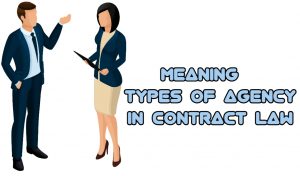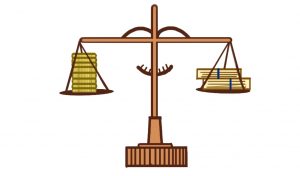Types Of Agency in Law: Agency is the legal status of a person to act in the capacity of another. In other words, agency is a relationship which arises where a person known as the agent has the express or implied authority to act in the capacity of another person known as the principal, and such act has the same effect as though it were in fact performed by the principal.
Agency is a kind of fiduciary relationship because it is a relationship which is formed on the basis of trust and confidence. There are basically two parties in an agency relationship which are the Principal and the Agent. Agency can also be of tripartite nature where it includes another person known as the third party.

The Principal: the principal is the party on whose behalf the agent carries out a given duty. The principal is liable in law for the acts of his agent which he expressly authorizes or impliedly, being incidental to the agent’s duty which the principal did not expressly prohibit. The principal therefore remains liable in so far as the agent acts for him within the scope of his employment.
The principal may be disclosed or undisclosed.
Where the principal is disclosed, it simply implies that the existence of a principal is made known to the third party either by the agent or by the principal himself. What this means is that it is brought to the knowledge of the third party that there exist a principal on whose behalf the agent is acting. The identity of the principal need not be known. Mere knowledge by the third party of the fact that a principal exist is enough to constitute the legal position of a disclosed principal.
Where the principal is not disclosed, is simply means the opposite of a disclosed principal which is that the existence of a principal is not brought to the knowledge of the third party.
Where the principal is disclosed, it has certain legal effects which includes that the principal would be allowed to ratify a contract entered into by his agent without his prior authorization. Also where the principal is disclosed, it makes it clearer to determine whom to sue upon the occurrence of a breach.
The Agent: an agent is the party employed, engaged or contracted by the principal to act for him in his capacity. Agents can be of different types. Generally, agents are paid commission upon the performance of their duty. Where the agent is a sole agent, contract with the principal by others may not be completed without going through him. An agent may be Special Agent, Universal Agent or General Agent.
The category which an agent falls under from the above depends on the scope and nature of his agreement with the principal. Also on the other hand, whether he is a universal, special or general agent determines the scope and extent of which such an agent can operate in acting for the principal.
The Third Party: the third party is the person to whom a representation is made to. The representation is on the fact that a particular person (the agent) is the agent or acts as the agent of another. Such representation may be express or implied from the conduct or usual course of dealing.
Agency relationship creates certain rights and obligations between the principal and the agent. Whether or not agency relationship exists, is a question for the court to determine upon the assessment of the relevant circumstances and conditions.

RECOMMENDED: Schools of thought in law discussed
Types of Agency in Law
Agency can be created by difference means. They include:
a. By Agreement: agency relationship can be created by express or implied agreement between the principal and the agent. The agreement need not take any prescribed format. It may be orally or in writing, however, where it is a contract embedded in a deed for a lease of more than three years, then it is required that it be in writing.
Also where it is statutorily provided that an agency agreement should be in wiring, then such statutory provision must be complied with.
b. By Ratification: agency relationship may arise by way of ratification. Here, the agent had an existing agency relationship with the principal, however, he does act which is not authorized by the principal. The principal may then choose to ratify or not to ratify the act.
Where he ratifies the act, the agency relationship is sustained and he remains bound by such act of the agent as though he authorized the act from the beginning. Where the principal chooses to ratify under this heading, he must ratify the whole act or contract and such ratification must be done within a reasonable time. He must be a named principal, and he must be shown to have knowledge of the act authoritatively performed by the agent.

c. By Estoppel: agency by estoppel arises where a party makes a representation to another party known as the third party, that a particular person is his agent. Here such a party is estopped from asserting otherwise and is bound for the act of such agent, unless the principal has made a reasonable communication of disclaimer to the third party disclaiming the person in question as his agent.
Therefore for agency by estoppel to arise:
a. there must be a representation made to a third party
b. the third party must have relied on the representation and acted on it
c. the principal must not have communicated a disclaimer as pertaining the termination of his agency relationship with the agent
Recommended: Exceptions to the principle of delegatus non potest delegare rule
In Summon V Salomon, the principal employed his nephew as his agent in his jewelry shop. Subsequently, his agency position was terminated. His nephew went afterwards and ordered for jewelry on behalf of the owner (the principal) and disappeared. The principal was held liable for the price of the goods, even though he had terminated the agency of his nephew. He did not communicate disclaimer to his supplier whom in the course of their business had known his nephew as his agent.

d. Operation of Law: agency by operation of law has two heads which are; agency by cohabitation and agency by necessity.
i. By Cohabitation: Agency by cohabitation arises and is based upon the presumption of marriage between a man and a woman living together where it can be presumed that they are husband and wife. This implies that where a man and a woman cohabits as husband and wife, the woman is presumed to be the agent of the man in certain instances.
Therefore the woman can always pledge the husband’s credit. However, this does not apply where the man had outrightly warned the salesman not to sell goods to the woman in his credit, or where the woman is shown to be financially buoyant or is supplied enough resources to purchase necessaries.
ii. By Necessity: Agency by necessity arises where upon an already existing agency relationship between the agent and the principal, there arises a cause which is incidental to the duty of the agent of which its non-performance jeopardizes the economic interest of the principal. Such incidence must be of imminent danger, and there must have existed an impossibility to contact the principal in such an emergency situation.
If it is shown from the circumstances that it was in fact possible to have reached out to the principal for his authorization, the agency by necessity will not avail the agent as he would be bound in person a though he was never an agent of another.
RECOMMENDED: Differences between Offer and Acceptance in contract law
Types of Agency

a. Del Credere Agent: A del credere agent undertakes to indemnify the principal upon the breach of payment by a third party. A del credere agent can be likened to a guarantor. He guarantees that upon default by a specific third party, he is to be bound. A del credere agent is usually paid a commission known as del credere commission.
b. Partners: In a partnership, each of the partners is regarded as the agent of the other partners.
c. auctioneer: An auctioneer is an agent employed for the purpose of selling goods at auction sales. An auctioneer is required to be licensed. The law imposes on him not to make sales below the reserved price and also not make credit sales.
d. Banker: A bank or banker becomes an agent of the customer in certain relations. For instance, where a banker receives instruction from the customer of which he is obliged to perform; such as paying in deposits, paying an amount specified in a cheque in favour of the payee.
Agency relationship may also arise between the banker and the customer where the banker contracts a performance bond with the customer, undertaking to carry out a specified project for the customer upon the payment of the charged fee which includes the bank’s commission and interest.
e. Broker: a broker brokers the deal between a party and another. This simply means that a broker is an agent who negotiates agreement between a party and another (the principal). A broker need not be in physical possession of the goods which is the subject matter of the contract. A broker is paid a commission known as brokerage.
f. Estate Agent: an Estate Agent engages in buying and selling of landed properties which includes lands, houses, and may in fact extend to the marketing and selling of home use chattels. An estate agent is paid a commission upon successful sales made.

Also see: Forms of government practiced in the world
g. Mercantile Agent: Mercantile agency is a type which creates a relationship where the agent id authorized to makes sales on behalf of the principal in the customary course of business. Buying goods from a mercantile agent transfers ownership and title to the purchaser as tough it was in fact purchased from the original owner himself, since a mercantile agent has the full authority of the owner, he can therefore sell in his name.
h. Sole Agent: Sole agent is a distinct type of agency which encompasses through other types. Sole here implies that there is only one person through which the transaction with the principal can be perfected. Therefore, even if there are other sub-agents or other unauthorized or self-acclaimed agents, the transaction must still be perfected through the sole agent and his commission be paid thereon. Whether one is a sole agent or not can be inferred from the circumstance and wordings creating the agency relationship.

Edeh Samuel Chukwuemeka, ACMC, is a lawyer and a certified mediator/conciliator in Nigeria. He is also a developer with knowledge in various programming languages. Samuel is determined to leverage his skills in technology, SEO, and legal practice to revolutionize the legal profession worldwide by creating web and mobile applications that simplify legal research. Sam is also passionate about educating and providing valuable information to people.
real understand the note, hope you post again
real understand the note,